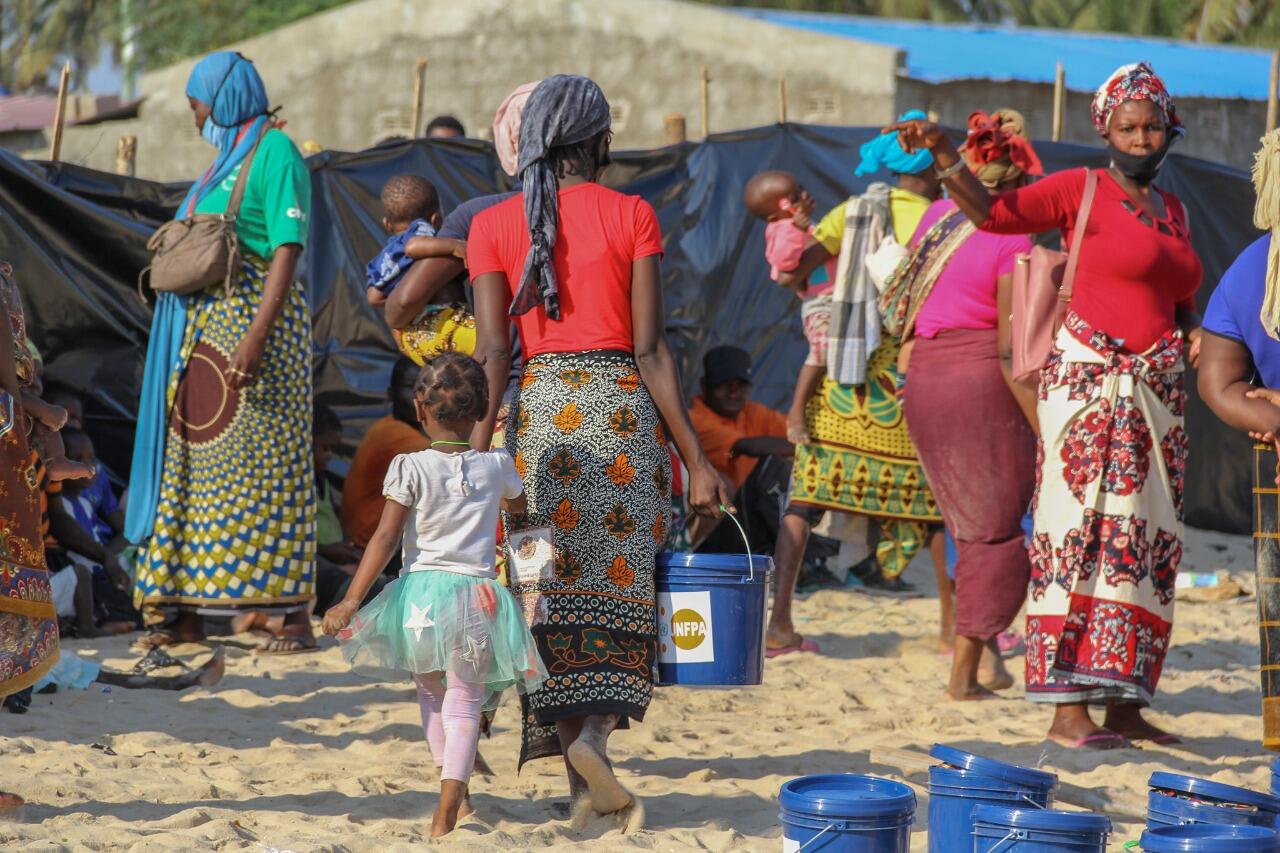4 March 2021 - MOZAMBIQUE - UNFPA, the United Nations sexual and reproductive health agency, today launched a humanitarian appeal for $12 million USD to urgently provide life-saving sexual and reproductive health and protection services to 330,000 women, girls, and youth impacted by the humanitarian crisis in Cabo Delgado, Mozambique, and the secondary impacts of COVID-19.
The agency is urging the international community to increase funding as women, girls, and young people face increased risk of gender-based violence, and increasingly restricted access to life-saving sexual and reproductive health services. Internal displacement of people by either violence or environmental disaster - including the devastating Cyclone Kenneth from 2019 - has left more than 1.3 million people in the northern provinces of Mozambique in need of urgent humanitarian assistance.
More than 669,000 people are internally displaced (as of 10 February 2021), including some 160,000 displaced women of reproductive age who could face unwanted pregnancies and increased risk of HIV and STIs without family planning support. An overstretched health system with many facilities either closing or lacking personnel and medical supplies could worsen the provision of emergency obstetric care for the nearly 19,000 displaced women who are pregnant, and the 2,100 expected to deliver within the month.
“Cabo Delgado is experiencing the perfect storm of conflict, cyclones, COVID-19, and cholera - and women and girls are bearing the highest brunt of these crises. They continue to be on the move, with many having to flee their homes at moments’ notice without any personal items or access to services to look after their health, hygiene, or safety,” notes Andrea M. Wojnar, UNFPA Representative in Mozambique.
With women and girls living in overcrowded displacement camps and in host communities, UNFPA estimates that more than 3,200 displaced women may require urgent care in response to sexual violence. Without access to safe delivery and emergency obstetric care services, 950 displaced women risk maternal death over the next three months, and nearly 46,000 displaced women face an increased risk of unintended or unwanted pregnancy if they are unable to access family planning.
UNFPA is working with local authorities and partners to increase the availability of, and access to, life-saving sexual and reproductive health services, prevent and respond to gender-based violence, address COVID-19 and mitigate its secondary impacts on women and girls.
To prevent unwanted pregnancies and reduce maternal mortality, funding will be used to support temporary health centers, equip health facilities with urgent supplies and contraceptives, train medical personnel, and deploy mobile health clinics to provide remote-based care.
Responding to the acute risk of gender-based violence, the funds will enable UNFPA to distribute female dignity kits, disseminate life-saving information on available services, and ensure continuity of centers that provide counseling, information, and support. In response to COVID-19, funding support will protect health workers, enable community surveillance, and disseminate prevention messaging, among other key activities.
In Cabo Delgado, UNFPA has supported the Government of Mozambique in the following:
- 20,000 women and girls from remote areas have received sexual and reproductive health and GBV services through mobile health clinics.
- 317 service providers and hotline operators have received training to provide GBV services and support in the context of COVID-19.
- 12 health tents were installed to enable safe access to sexual and reproductive health services and protect 70,000+ women and girls by adhering to COVID-19 safety measures.
- 3,500 women and girls received dignity kits to support menstrual hygiene and mitigate risks of gender-based violence.
- 10 women and girls safe spaces were constructed to provide up to 250 women and survivors of gender-based violence with access to psychosocial support, GBV case management, life skills, stress-reduction activities, and livelihood training.
“Even before the current crisis, Cabo Delgado’s women and girls were highly vulnerable, with just one in five girls married or in a union using contraceptives - one of the lowest in Mozambique. The province also has the highest pregnancy rate among adolescents aged 15-19 years and the second-highest rate of child marriage in the country.
If we do not act now, the consequences will be devastating for years to come. We are appealing to the international community to increase funding support so women, girls, and youth can get the life-saving humanitarian assistance they require,” concludes Andrea M. Wojnar.
As of February 2021, 25% of funds have been secured, leaving a funding gap of $9 million USD.
###
ABOUT
UNFPA is the United Nations sexual and reproductive health agency, where it aims to deliver a world where every pregnancy is wanted, every childbirth is safe and every young person’s potential is fulfilled. UNFPA is the lead agency on both gender-based violence and sexual and reproductive health during humanitarian emergencies.
Mozambique - Jessica Lomelin, lomelin@unfpa.org, +258 85 510 3274





